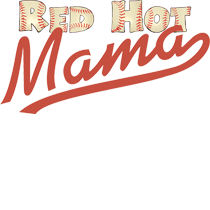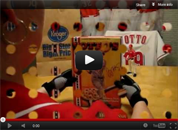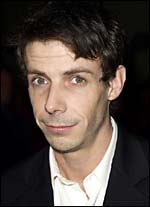Trading in baseball is like world economics: entities exchanging goods to try to get everything they need. And though the exchange is for the benefit of everyone involved, the entities know they are ultimately in competition with each other. It's a shrewd game, but the principles for coming out a winner are simple:
- Buy low, sell high.
- Do what you do best and import the rest.
- There's a sucker born every minute.
With those principles in mind, I examined the most trade-likely Reds to see whether trading them made sense. Let's look at some of the possible participants in this game of baseball musical chairs.
Joe Randa
Oh that rakish Randa! He's a human highlights reel! He's a fan favorite! He's got to go! Here's why:
- Randa is the perfect example for “buy low, sell high.” He's high, and he hasn't given possible buyers any reason to believe he won't stay that way for the rest of the season and beyond.
- Randa is expecting to go. It seems like the only thing the press ever quotes him about. He knew the deal when he came on, and he's made the most of it. I think that not trading him now could be the kind of anti-climax that could screw him up for the rest of the season.
- Infielders we have. Which of the available infielders would be best to take his place is a discussion for its own post, but with a surplus the economical thing to do is trade for something we lack.
Rich Aurilia
Rich Aurilia and the Reds needed each other for very specific purposes. Aurilia needed to prove he wasn't entirely washed up, and the Reds needed someone to be Felipe's villain. Both have been fulfilled nicely.
Aurilia is as high as he's going to get. It is time to sell.
Sean Casey
Sean Casey is not a good candidate for trading right now. Reasons include:
- Casey occupies a power position and even the moderate power he used to have is flickering. What contender would want that? He is low; don't sell. Besides, I suspect that we'll see him make some adjustments and come into 2006 looking more like the old Casey, and then it would be reasonable to trade him if the need still exists.
- While it would clear up a spot in the over-crowded outfield, who would back up Dunn at first once Casey was gone? They had Valentín out there a lot during spring training. I don't think anyone wants that. Better to open up a spot in the outfield by moving an outfielder.
- Trading Casey would be hugely popular with tons of people online, but hugely unpopular with many more tons of real-life humans. By itself that's not a reason to make a decision, but since trading Casey would be a bad idea anyway, it just fans the fire.
No, though it's agonizing to watch him ground into another double play, the Reds are better off keeping him. Move him down in the order, give him some days off, do what you can to help him get his pop back, and hope you're not faced with this dilemma next July.
Adam Dunn
Dunn is Maybe. His value is so difficult to define. Is he high? He's a heck of a hitter when he hits. But maybe he's low, what with all those strike-outs. He sometimes looks like a liability in the field, but then again, he's real tall so maybe those long strides just give the illusion that he's slow. He seems like a real gamer one day but then he comes off as flippant the next. Maybe you don't want to build a team around him since it sounds like he will bolt for Texas as soon as free-agency rolls around, but then again, that's not for two more years so maybe you should take advantage as long as possible.
What to do, what to do. It's a question for the baseball minds of the ages. I'd act like he was the highest of the high and if someone was willing to buy at that price, give it a go. I doubt anyone would be willing to pay my price.
Ken Griffey, Jr.
Griffey is undoubtedly high, and the way he's hinting at further ascension has to be making some power-poor teams drool. The question is whether his trade value is higher than his nontrade value. Healthy or otherwise, Griffey puts butts in the seats, and anyone he was exchanged for would need to do something comparable. The Reds would only be looking to take on someone like that if they were contending, so I think this isn't the time for Griffey to go either.
Austin Kearns
Kearns is kicking ass in AAA, but he's in AAA. That's low. Someone would have to be willing to deal for him as if he were at 100% potential, and that doesn't seem likely.
Which only leaves…
Wily Mo Peña
Wily Mo could be great. Maybe he'll be phenomenal. He might just be the kind of player that leads teams to championships. That potential is real. Everyone can see it. He's high.
And it just so happens that the Reds, a team that does power outfielders well, seem to be a little heavy on power outfielders at the moment. Sounds like an opportunity to me.
Kent Mercker and David Weathers
NO! NO! NO! The Reds need to buy pitching, not get rid of what little they have that's working. They brought these guys in to be the veterans and help preen the new guys. Trading them now would not only not bring enough in return but would also defeat the purpose of bringing them here in the first place.
But that's probably what they'll do. Isn't that how Mercker got sent away last time?
And they wonder why they have no pitching.
Eric Milton
There couldn't be a much worse time to trade Eric Milton than right about now, except maybe three weeks ago. He is as low as he can get. He's nationally reknowned for how low he is. Milton is the Death Valley of major league players.
He's so low, in fact, that the Reds would have to pay him to play for someone else, and that just doesn't make sense. Even if Milton were showing no signs of improvement, which he is, it would make more sense to sit him the rest of the season than to pay him to play for someone else this early in his contract.
“But you are willing to pay Graves to play badly elsewhere,” you might say, “aren't you a freaking hypocrite?”
Well, no. Having Graves on the team was worse than having no one, so it made financial sense to pay to cut him loose. The Reds received returns on their investment: a statement that Graves' performance wasn't acceptable, the removal of an attitude from the clubhouse, and the semblance of motion, if not actually progress.
You can debate whether they got a good return for the investment, but none of those issues apply to Milton so there would be no return for paying to drop him. Move him to the bullpen, sit him if necessary, but if you have to pay him anyway, have him working for you.
Same goes for Ortíz, whom I haven't included separately because I haven't heard his name mentioned much.
So there you have it: pearls of trading wisdom from a rank amateur. Can the Reds come out on top this trading season? I hope so. At the very least, I hope they don't turn out to be the suckers.



